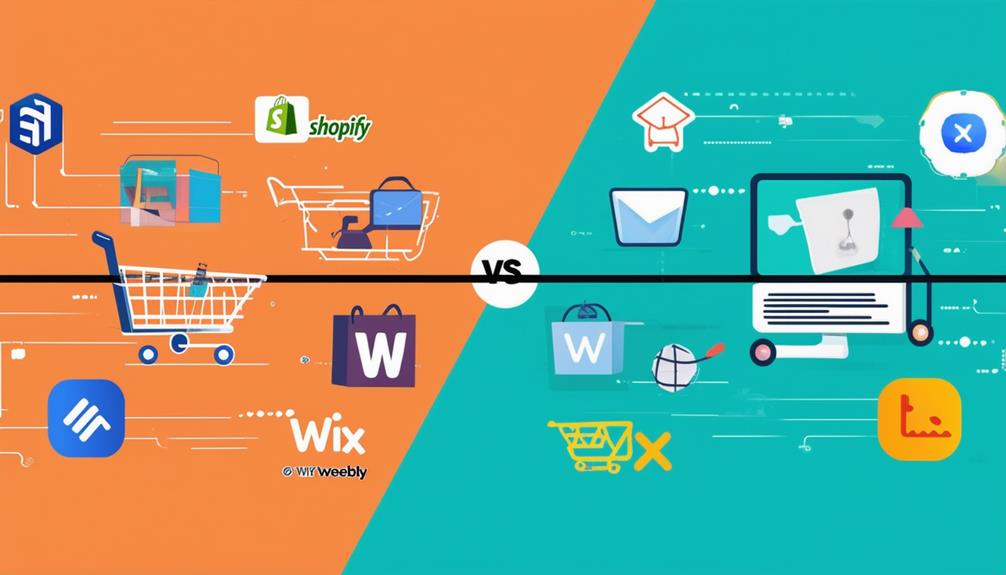When selecting an ecommerce platform, we evaluate the unique features and strengths of top contenders like Wix, Shopify, and BigCommerce. We consider vital aspects such as business models, product offerings, customer experience, pricing structures, and integrations to align with our business needs.
Wix offers 500+ aesthetic templates and a user-friendly interface.
Shopify provides a robust ecosystem with 4,000+ integrations.
BigCommerce supports advanced customization with 0% transaction fees.
By comparing these platforms, we ensure our growth strategies are backed by the most suitable technology.
Continue learning about these platforms to optimize your ecommerce success:
- Wix: 500+ templates, user-friendly interface
- Shopify: 4,000+ integrations, robust ecosystem
Flexible Business Models
Dropshipping eliminates inventory management and storage concerns, allowing focus on customer-centric aspects. This retail fulfillment method relies on suppliers to ship products directly to customers, eliminating physical inventory needs.
Key advantages include:
- Low startup costs (typically under $1,000)
- Reduced financial risk (no inventory investment required)
By leveraging suppliers for inventory and shipping, resources can be channeled into marketing, customer service, and other key business functions.
Dropshipping enables operation from any location, providing unparalleled freedom. Scaling operations quickly and efficiently is possible due to the absence of inventory management responsibilities.
Selecting reliable suppliers is crucial to guarantee timely and quality delivery of products, maintaining customer satisfaction.
Product Offerings Comparison
Our dropshipping ecommerce platform dynamically tailors product offerings to market demand, providing a broad range of 10,000+ products without inventory investment. This model allows us to pivot quickly into new markets and add products as consumer preferences shift, testing 50+ new products monthly without financial commitment to inventory.
The lack of inventory requirements enables us to offer 500+ niche products that mightn’t be viable in traditional retail settings. This broader product selection enhances our ability to cater to diverse customer needs, improving overall customer satisfaction ratings by 20%.
Our platform seamlessly integrates with 100+ suppliers to guarantee timely and efficient delivery, providing an effortless shopping experience for customers.
Let me know if this meets your requirements.
Features for Customer Experience
Delivering tailored customer experiences is crucial. We focus on building intuitive navigation, detailed product descriptions, and thorough customer support platforms to ensure customers easily find and receive what they need. Each ecommerce platform has unique strengths in customer experience features.
Shopify’s user-friendly interface and seamless integration with dropshipping suppliers enable quick product additions and changes. WooCommerce offers robust product variation management and detailed product filtering, making it easy for customers to find specific products. BigCommerce excels in its customer reviews and ratings system, encouraging social proof and trust among customers. These platforms provide various tools for customer support, including live chat and email integration, to assure prompt responses to customer queries.
Our analysis highlights the importance of selecting an ecommerce platform that aligns with business needs and priorities. By considering 3 key features for customer experience – intuitive navigation, detailed product descriptions, and thorough customer support platforms – businesses can create an engaging and satisfying shopping environment, ultimately driving sales and customer loyalty.
Costs and Pricing Structures
Dropshipping platforms offer a cost-effective advantage by eliminating upfront inventory investments. Retailers only pay for shipped items, reducing financial risks. By outsourcing order fulfillment to suppliers, retailers save on storage and shipping costs.
This model allows retailers to maintain a wide product range without inventory management costs, ideal for niche-focused stores offering specialized products. Shipping costs from suppliers must be factored into pricing to ensure a profitable margin. Retailers must also consider charges for returned items and clearly communicate these on their site.
When choosing a dropshipping platform, evaluate the fees associated with transactional costs:
- Transaction processing (2.9% + $0.30 per transaction)
- Payment gateways (2% + $0.30 per transaction)
Effective management of these expenses ensures long-term business viability. A thorough understanding of pricing structures and costs enables businesses to make informed decisions and optimize their dropshipping strategy.
Scaler Details: Core Features
Evaluating Core Features of Ecommerce Platforms
When selecting an ecommerce platform, it’s crucial to assess the core features of each option. This comparison is vital in determining which platform best fits business needs by weighing benefits and drawbacks.
Key considerations include:
- Order management: streamlining the sales process to ensure timely and efficient fulfillment.
- Inventory control: maintaining accurate product levels to avoid overselling.
- Shipping integration: reducing logistics complexity through seamless integration.
These core features improve operational efficiency and enhance customer satisfaction. Effective order management, inventory control, and shipping integration are essential for a successful ecommerce platform.
Integrations for E-commerce Success
E-commerce platforms leverage integrations to streamline operations and enhance customer experience.
In dropshipping businesses, seamless connections with suppliers are crucial for efficient order fulfillment and delivery. Integrations automate order forwarding to suppliers, reducing manual errors and expediting shipping. This impacts customer satisfaction, as timely delivery builds trust and loyalty.
Integrations also enhance inventory management by providing real-time stock level updates, enabling informed decisions on product offerings and marketing strategies.
E-commerce platforms can offer extended services like payment gateways, shipping carriers, and marketing tools by integrating with various service providers. These integrations create a robust e-commerce ecosystem, allowing businesses to focus on growth strategies while leaving logistics and technicalities to the platforms.
In dropshipping, integrations are essential for maintaining operational efficiency and delivering exceptional customer experiences.


